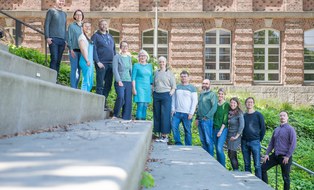Way of Working and Approach to Counseling
Table of contents
Way of Working
The offers provided by Central Student Information and Counseling Service are aimed at both prospective students and students.
A counseling session with us is voluntary, confidential, anonymous if requested and without any preconceived views as to the outcome. Not having fixed expectations regarding the outcome means that your counseling concerns are at the centre of the discussion and the subsequent solutions are geared towards your individual needs, wishes and possibilities. The responsibility for developing solution strategies remains with you. We do not make the decisions for you or prescribe solutions, but we rather assist you during the counseling process in order for you to be able to gain new perspectives, discover resources, explore alternative paths, and find your own solution. We coordinate our approaches with you. If necessary, we can direct you to other counseling facilities.
Approach to Counseling
We follow the general principles for student counseling services in Germany and have developed our own guideline (in German).
General Principles of Student Counseling
In Germany, there exist generally accepted and well-established counseling principles, which also form the foundation of our conversations here at the counseling centre. For a better understanding, keep in mind that the first four principles pertain to the concrete work of the counselor with individuals seeking help and advice, while the six principles that follow relate to the function of the counseling centre as an institution. They serve primarily to ensure quality.
Principles for Working with Clients
1. Focussing on the Client and their Needs / Neutrality
2. Voluntary Participation
3. Confidentiality
4. Transparency
Principles Regarding Work in the Counseling Centre
5. Integration and Cooperation
6. Autonomy in Regard to Content
7. Further Training, Supervision and Evaluation
8. Collegiality and Democratic Internal Decision-Making
9. Diversity of Methods
10. Prevention
1. Focussing on the Client and their Needs / Neutrality
In counseling in general, one must consider the conditions and environment of the individual client and not the expectations and goals of the institution. This of course also applies to counseling services at universities. Counseling is essentially supporting self-help, granted in the best interests of pupils, university students or employees who are seeking advice. Counseling services should assist them in taking the initiative and developing an ability to solve problems independently, and should be an effective aid in resolving decision-making conflicts and in managing personal problems in the areas of life, work and learning. Administrative measures or interference in the interest of the institution must be ruled out. Student counseling at TU Dresden follows four pillars or operating principles: Lebensweltorientierung [lifeworld orientation], biographical structuring, orientation towards networks and gender-specific aspects.
2. Voluntary Participation
Individuals seeking advice cannot be compelled to go to a general student counseling session. In this regard, the counseling centre sees itself as a service centre. An obligation in this sense can only pertain to the academic advisory service (at the faculty) if the required credits have not been obtained (based on the Saxon Freedom of Universities Act or the study documents).
3. Confidentiality
The student counselors are bound by confidentiality. Especially concerning conflicts between students and teaching staff the importance of protecting the individual seeking advice is self-evident, in order to prevent this individual from prejudice in their studies. This creates trust during counseling sessions.
4. Transparency
The counseling process and its goals must be transparent and comprehensible to both the individual seeking advice and the counselor. Ideally, the goals are established together. A transparent counseling process supports the client with taking the initiative and helps to pinpoint suitable areas in which this individual could help themselves.
5. Integration and Cooperation
Counseling issues and decision-making conflicts should be tackled in the most comprehensive manner possible. Counseling which is integrated to the greatest possible extent should be pursued through close cooperation with other institutions within and outside the university – especially through close cooperation between general, subject-based and psychosocial counseling. The goal is to refer the client as seldom as possible or only once and to link together the counseling facilities.
6. Autonomy in Regard to Content
Counseling work is performed independently. Employees and counseling centres are unrestricted by individual directives in regard to the content and format of counseling. The aim is for the counseling centre to achieve the greatest possible level of institutional independence/autonomy.
7. Further Training, Supervision and Evaluation
Due to the diversity and dynamics of the scope of duties and the different levels of professionalism, it is necessary to constantly evaluate and improve the work being carried out at the counseling centres. It is also necessary to scrutinise the design of individual counseling formats (ideally through supervision) and to acquire new personal/learning experience and knowledge within the framework of further training.
8. Collegiality and Democratic Internal Decision-Making
Internal work organisation is characterised by rather collegial team structures. We strive for the greatest possible degree of consensus in important matters of the counseling centres. This is particularly important for team-building, as well as for outward credibility and loyalty.
9. Diversity of Methods
The counselors offer different types of counseling and are autonomous in regard to the content of their counseling process and in the choice of counseling techniques. This ensures a certain level of diverse methods, which makes it possible to adapt to different counseling requirements. Being open to new methods and techniques is indispensable.
Offering counseling, which is targeted at certain groups in order to meet their specific needs (such as during the programme orientation phase and the university entry phase or support for student self-help groups), also contributes to the goal of employing diverse methods.
10. Prevention
Experiences and insights gained at the counseling centre are used to provide feedback to the applicable university facility in order to improve conditions for students. The Central Student Information and Counseling Service provides suggestions for improving study conditions, contributes to higher education reform and trains those individuals and bodies who distribute knowledge and information (student tutors, counseling infrastructure of the university etc.). Fulfilling this task requires a (critical) reflection of academic learning and working conditions, as well as the knowledge of potential university-related and non-university-related stress factors, which affect the behaviour or attitude of students.
Quality of Counseling at the Dresden University of Technology
At Dresden University of Technology, the Counseling Coordination Circle, chaired by the Vice-Rector Academic Affairs, meets regularly with the aim of further developing the quality of counseling at TU Dresden. As a result of a lengthy process, a Guideline for the Quality of Counseling at TU Dresden (document in German) was created, which is aimed at both individual counselors and institutions with a counseling mandate and formulates a quality standard for counseling.
 © Sven Ellger/TUD
© Sven Ellger/TUD
Central Student Information and Counseling Service
Send encrypted email via the SecureMail portal (for TUD external users only).
Visiting address:
Fritz Foerster Building, floor 0 Mommsenstraße 6
01069 Dresden
Office hours:
- Monday:
- 10:00 - 12:00
- Tuesday:
- 13:00 - 16:00
- Thursday:
- 13:00 - 16:00
- Friday:
- 09:00 - 12:00
During open consultation hours, a student counselor is available for a brief consultation without an appointment. Please pick up a numbered ticket at the service point of the ServiceCenterStudies first. Alternatively, you can also call us.

